Here is a selection of books that can be used to help expand your knowledge of Indigenous issues, cultures, and history and to support you in your journey as you incorporate Indigenous content and pedagogy into your classroom.
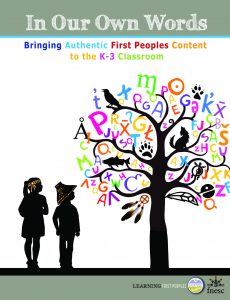 In Our Own Words, by the First Nations Education Steering Committee
In Our Own Words, by the First Nations Education Steering Committee
Grades: K-3. This resource provides an array of ideas and suggestions that can be applied in whole or in part to incorporate First Peoples content into a K-3 classroom. Includes specific information on incorporating creation and origin stories into the classroom in a respectful and authentic way. By using this resource and remaining open to respectful dialogue and consultation with members of the local First Peoples communities, teachers will benefit their students and expand their own comfort with this material.
 Aboriginal worldviews and perspectives in the classroom: Moving forward, by the BC Ministry of Education
Aboriginal worldviews and perspectives in the classroom: Moving forward, by the BC Ministry of Education
Grades: K-12. This resources is designed to answer a number of questions, including what is meant by Aboriginal education and by Aboriginal worldviews and perspectives; what is required of teachers and of the education system in order to provide appropriate and authentic teaching in line with the First Peoples Principles of Learning; and where teachers can turn for guidance and support in modifying their practice to incorporate new content and approaches. Specifically discusses connection to land as a characteristic of Aboriginal worldviews and perspectives and the need to incorporate this in the classroom. (eBook)
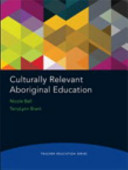 Culturally Relevant Aboriginal Education, by Nicole Bell and Terrylynn Brant
Culturally Relevant Aboriginal Education, by Nicole Bell and Terrylynn Brant
Grades K-12. Provides teacher candidates and in-service teachers with relevant information to help them integrate Aboriginal, First Nations, Métis, and Inuit content, customs, and traditions into the classroom, providing students with a broader perspective of Canada and its population.
 Bridging cultures: Scientific and indigenous ways of knowing nature, by Glen Aikenhead and Herman Michell
Bridging cultures: Scientific and indigenous ways of knowing nature, by Glen Aikenhead and Herman Michell
Grades: K-12. This book supports science teachers, teacher candidates, and science educators preparing to implement science curricula that recognize Indigenous knowledge as a foundational way to understand the physical world.
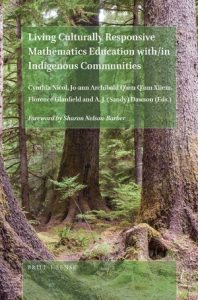 Living Culturally Responsive Mathematics Education with/in Indigenous Communities. Editors: Cynthia Nicol, Jo-ann Archibald Q’um Q’um Xiiem, Florence Glanfield and A. J. Sandy Dawson
Living Culturally Responsive Mathematics Education with/in Indigenous Communities. Editors: Cynthia Nicol, Jo-ann Archibald Q’um Q’um Xiiem, Florence Glanfield and A. J. Sandy Dawson
Grades: K-12. This book explores the nature of culturally responsive mathematics education. Chapters highlight the importance of relationships with communities and the land, each engaging critically with ideas of culturally responsive education, exploring what this stance might mean and how it is lived in local contexts within global conversations.
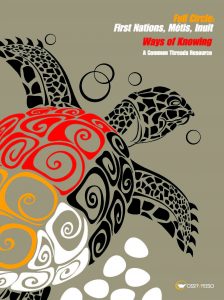 Full circle: First Nations, Metis, Inuit ways of knowing, by Ontario Secondary School Teachers’ Federation.
Full circle: First Nations, Metis, Inuit ways of knowing, by Ontario Secondary School Teachers’ Federation.
Grades 8-12. Lesson plans which encourage teachers to incorporate First Nations, Métis, and Inuit ways of knowing into the classroom in the four thematic areas of identity, health, Residential Schools, and land. Includes lesson plans directly related to Indigenous peoples’ connection to land.
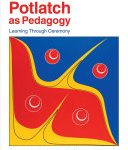 Potlatch as pedagogy: Learning through ceremony, by Sara Florence Davidson and Robert Davidson
Potlatch as pedagogy: Learning through ceremony, by Sara Florence Davidson and Robert Davidson
Grades: K-12. Educator Sara Florence Davidson saw how the Haida tradition of the potlatch – which she learned from her father, renowned artist Robert Davidson – could be integrated into contemporary educational practices. In this book, father and daughter present a model for learning that is holistic, relational, practical, and continuous.
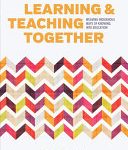 Learning and teaching together: Weaving indigenous ways of knowing into education, by Michelle T. D. Tanaka
Learning and teaching together: Weaving indigenous ways of knowing into education, by Michelle T. D. Tanaka
Grades: K-12. This book recounts how pre-service teachers immersed in a cross-cultural course in British Columbia began to practice Indigenous ways of knowing. Working alongside Indigenous wisdom keepers, they transformed earth fibres into a mural and, in the process, transformed their own ideas about learning and teaching.This book opens a path for teachers to nurture indigenist cross-cultural understanding in their classrooms.
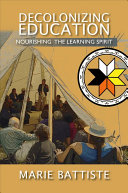 Decolonizing education: Nourishing the learning spirit, by Marie Battiste
Decolonizing education: Nourishing the learning spirit, by Marie Battiste
Grades: K-12. The author argues that the preservation of Aboriginal knowledge is an Aboriginal right and a right preserved by the many treaties with First Nations. Current educational policies must undergo substantive reform. Central to this process is the rejection of the racism inherent to colonial systems of education, and the repositioning of Indigenous humanities, sciences, and languages as vital fields of knowledge.
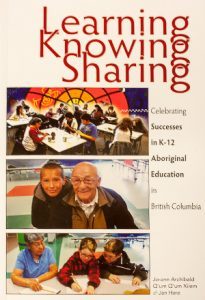 Learning, Knowing, Sharing: Celebrating Successes in K-12 Aboriginal Education in British Columbia, Edited by Jo-ann Archibald, Q’um Q’um Xiiem, and Jan Hare
Learning, Knowing, Sharing: Celebrating Successes in K-12 Aboriginal Education in British Columbia, Edited by Jo-ann Archibald, Q’um Q’um Xiiem, and Jan Hare
Grades K-12. Published by the BC Principals’ & Vice-Principals’ Association and the UBC Faculty of Education, this book highlights practices in British Columbia relating to Aboriginal Education. Topics include Indigenous knowledge, Indigenous language revitalization, Aboriginal family and community engagement and partnerships, and more.
 Indigenous storywork: Educating the heart, mind, body, and spirit, by Jo-Ann Archibald
Indigenous storywork: Educating the heart, mind, body, and spirit, by Jo-Ann Archibald
Grades: K-12. Builds on the seven principles of respect, responsibility, reciprocity, reverence, holism, interrelatedness, and synergy that form a framework for understanding the characteristics of stories, appreciating the process of storytelling, establishing a receptive learning context, and engaging in holistic meaning-making. Archibald worked closely with Elders and storytellers in order to develop ways of bringing storytelling into educational contexts. (eBook)
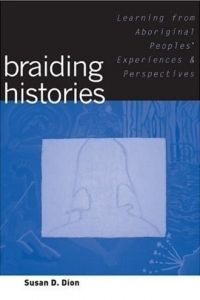 Braiding histories: Learning from Aboriginal peoples’ experiences and perspectives, by Susan D. Dion
Braiding histories: Learning from Aboriginal peoples’ experiences and perspectives, by Susan D. Dion
Grades: 10-12. Reflecting on the process of writing a series of stories, Dion takes up questions of (re)presenting the lived experiences of Aboriginal people in the service of pedagogy. Investigating what happened when the stories were taken up in history classrooms, she illustrates how our investments in particular identities structure how we hear and what we are “willing to know”. Will appeal to readers seeking a better understanding of colonialism and Aboriginal–non-Aboriginal relations. (eBook)
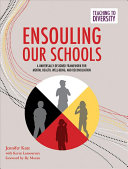 Ensouling our schools: A universally designed framework for mental health, well-being, and reconciliation, by Jennifer Katz, with Kevin Lamoureux
Ensouling our schools: A universally designed framework for mental health, well-being, and reconciliation, by Jennifer Katz, with Kevin Lamoureux
Grades: K-12. The authors share methods of creating schools that engender mental, spiritual, and emotional health while developing intellectual thought and critical analysis, as well as Indigenous approaches to mental and spiritual health that benefit all students and address the Truth and Reconciliation Commission Calls to Action.
Chapter Books
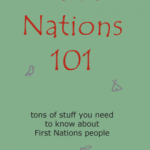 First Nations 101, by Lynda Gray
First Nations 101, by Lynda Gray
Grades: 9-12. Overview of the diverse and complex lives of First Nations people with subjects including veterans, youth, urbanization, child welfare, appropriate questions to ask a First Nations person, feminism, the medicine wheel, Two-spirit (LGBTQ), residential schools, the land bridge theory, and language preservation.
 Strength and struggle: Perspectives from First Nations, Inuit, and Metis peoples in Canada, educational advisors, Rachel A. Mishenene and Pamela Rose Toulouse, reviewed by, Denise Augustine et al., contributions by various authors and artists
Strength and struggle: Perspectives from First Nations, Inuit, and Metis peoples in Canada, educational advisors, Rachel A. Mishenene and Pamela Rose Toulouse, reviewed by, Denise Augustine et al., contributions by various authors and artists
Grades: 10-11. A rich array of short stories, poetry, music lyrics, graphic art, articles, essays, and other pieces that will have students laughing, crying, talking, and thinking. It is a true celebration of First Nations, Inuit and Métis writing and art. Part of McGraw-Hill Ryerson’s Lit Collection of supplementary student resources for high school English courses. Also includes an accompanying Teacher’s Resource here.
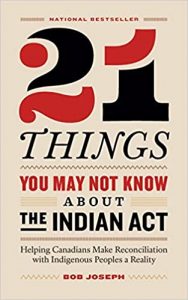 21 Things You May Not Know About the Indian Act, by Bob Joseph
21 Things You May Not Know About the Indian Act, by Bob Joseph
Grades: 3-12. The essential guide to understanding the legal document and its repercussion on generations of Indigenous Peoples, written by a leading cultural sensitivity trainer.
The Aboriginal Resource Library also has numerous kits from K-12 on this topic
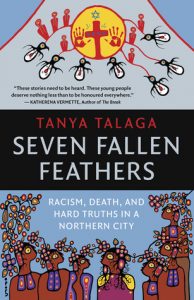 Seven Fallen Feathers, by Tanya Talaga
Seven Fallen Feathers, by Tanya Talaga
Grades: 10-12. Using a sweeping narrative focusing on the lives of the students, award-winning investigative journalist Tanya Talaga delves into the history of this small northern city that has come to manifest Canada’s long struggle with human rights violations against Indigenous communities.
Understanding Bias and Privilege